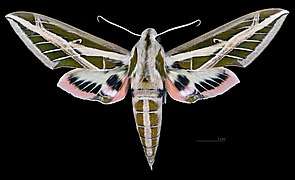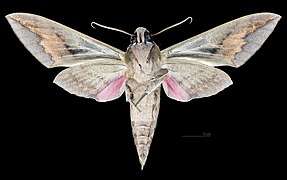Eumorpha fasciatus
| Banded sphinx moth | |
|---|---|
| Scientific classification | |
| Kingdom: | Animalia |
| Clade: | Euarthropoda |
| Class: | Insecta |
| Order: | Lepidoptera |
| Family: | Sphingidae |
| Genus: | Eumorpha |
| Species: | E. fasciatus |
| Binomial name | |
| Eumorpha fasciatus | |
| Synonyms | |
| |
Eumorpha fasciatus (banded sphinx moth) is a moth of the family Sphingidae.
Distribution
It is found from northern Argentina, Bolivia, Paraguay, Uruguay, Brazil, Colombia, Ecuador and Peru, north through Central America (Mexico, Belize, Guatemala, Honduras, Nicaragua, Costa Rica and Panama) to southern California and southern Arizona, east to Texas, Mississippi, Florida and South Carolina. Strays can be found north up to Missouri, Michigan, Indiana, Pennsylvania, New Jersey, New York and Nova Scotia. It is also found in the Caribbean.[2]
Description
 Male dorsal
Male dorsal Male ventral
Male ventral
Biology
Adults are on wing year round in the tropics, but in the north, there are at least two generations with adults on wing from the end of May to July and the end of August to October in South Carolina and from May to October in Louisiana. Adults have been recorded feeding on nectar of Crinum, Catharanthus roseus, Petunia and Saponaria officinalis.
The larvae feed on Ludwigia (including Ludwigia decurrens, Ludwigia erecta, Ludwigia leptocarpa, Ludwigia octovalvis, Ludwigia peruviana and Ludwigia repens), Cissus verticillata, Fuchsia hybrida, Magnolia virginiana, Parthenocissus and Vitis species. The larvae are highly variable in patterning and depth of colour. Pupation takes place in subterranean burrows.
Subspecies
- Eumorpha fasciatus fasciatus
- Eumorpha fasciatus tupaci (Kernbach, 1962) (Galapagos Islands)
Gallery
 Larva
Larva- Larva, Green Variation
- Larva, Pink Variation
- Larva, Black Variation
- Larva, Red Variation
- Larva, Multi-Colored Variation
- Pre-pupation color change
- Mid pupation
- Freshly Pupated Eumorpha fasciatus
- Eumorpha fasciatus Pupa
- Eumorpha fasciatus Imago (Adult Moth) Back View
- Eumorpha fasciatus Imago (Adult Moth) Side View
- Ludwigia peruviana With Larva
References
- ↑ "CATE Creating a Taxonomic eScience - Sphingidae". Cate-sphingidae.org. Archived from the original on 2012-11-13. Retrieved 2011-10-26.
- ↑ "Silkmoths". Silkmoths.bizland.com. Archived from the original on 2015-05-23. Retrieved 2011-10-26.
External links
- Banded sphinx Butterflies and Moths of North America